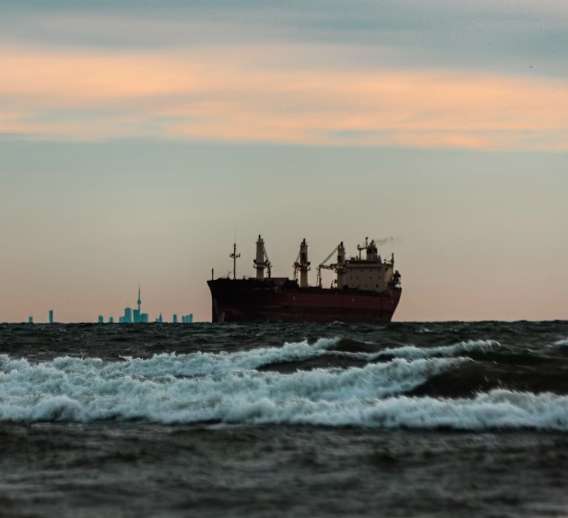CARICOM Discusses Maritime Emissions and Sustainable Blue Economy Development
The Caribbean Community (CARICOM) is embarking on a significant journey towards decarbonizing its maritime sector, a crucial step towards environmental sustainability and economic resilience for the region. On December 18th, the newly formed Maritime Technical Working Group (MTWG) held its inaugural meeting, marking the commencement of a concerted effort to address greenhouse gas emissions from ships. This initiative stems from a broader regional transportation meeting held in June, underscoring the growing recognition of the maritime sector’s contribution to climate change and the urgent need for transformative action. Led by Mr. Richmond Basant of Trinidad and Tobago, the MTWG initiated discussions on equitable emission reduction strategies, ensuring that the transition is fair and manageable for all member states. The group also delved into the principles of responsible ocean governance, recognizing its critical link to the burgeoning blue economy of the Caribbean, a vital source of livelihoods and economic prosperity for the region. Dr. Wendel Samuel, a prominent CARICOM leader, emphasized the paramount importance of these discussions for the region’s future.
The MTWG meeting served multiple crucial purposes. It facilitated the dissemination of vital information and updates to members, fostered the exchange of innovative ideas and best practices, and laid the groundwork for CARICOM’s strategic roadmap in maritime decarbonization. Critically, the meeting integrated the expertise of specialists from The University of the West Indies and the Maritime Technology Cooperation Centre, ensuring that the group’s deliberations are grounded in robust technical knowledge and cutting-edge research. While the specific details of the discussions remain undisclosed, the meeting provides a timely opportunity to explore the diverse array of decarbonization strategies currently being considered within the global shipping industry.
The shipping industry possesses a multifaceted arsenal of strategies and technologies to curb its greenhouse gas emissions. Enhancing energy efficiency is a cornerstone of this effort, encompassing the adoption of innovative ship designs that minimize drag and optimize fuel consumption, such as streamlined hull shapes and lightweight materials. Retrofitting existing vessels with energy-saving technologies, such as air lubrication systems and upgraded propellers, also offers significant potential for emission reductions. Transitioning to low-carbon fuels represents another promising avenue. Liquefied natural gas (LNG), biofuels, ammonia, and hydrogen are emerging as viable alternatives to conventional fossil fuels, paving the way for cleaner and more sustainable maritime operations. Furthermore, the integration of electric or hybrid propulsion systems offers a pathway towards zero-emission shipping.
Harnessing the power of renewable energy sources presents an exciting opportunity for maritime decarbonization. Integrating solar panels onto ships can provide supplementary power, reducing reliance on fossil fuels. Wind-assisted propulsion systems, such as sails and kites, offer a time-tested and increasingly sophisticated approach to utilizing natural forces for propulsion, harking back to the age of sail while incorporating modern aerodynamic principles. Operational changes also play a crucial role. Slow steaming, the practice of operating ships at lower speeds, significantly reduces fuel consumption. Optimizing routes through advanced digital tools allows for more efficient navigation, minimizing distances traveled and fuel burned.
Improving port infrastructure is essential to supporting the decarbonization of the shipping industry. Shore power, which allows ships to connect to electricity grids while docked, eliminates the need for running engines while in port, significantly reducing emissions and noise pollution in port cities. Streamlining loading and unloading practices minimizes delays and further enhances efficiency. Regulatory and market measures provide the necessary framework for driving change. Adherence to international regulations, such as the International Maritime Organization’s (IMO) decarbonization targets, sets a common standard for the industry. Participating in carbon pricing mechanisms or emissions trading systems creates economic incentives for reducing emissions and investing in cleaner technologies. Modernizing the global fleet by retiring older, less efficient vessels and replacing them with modern, eco-friendly ships is a long-term but crucial step towards achieving sustainability.
Battery technology is rapidly transforming the marine landscape, offering a compelling pathway towards zero-emission boating. Battery-powered boats utilize stored energy to drive electric motors, eliminating greenhouse gas emissions during operation. Lithium-ion batteries, known for their lightweight, durable nature, and high energy density, are the preferred choice for most electric boats. Charging can be accomplished through shore power connections or, increasingly, through onboard solar panels or regenerative systems. This technology is being adopted across a wide spectrum of vessels, from small recreational boats like kayaks and fishing boats to larger passenger ferries and even luxury yachts. The advantages of battery-powered boats are manifold. They produce zero emissions, operate silently, and boast lower operating and maintenance costs compared to their fossil-fuel counterparts. However, limitations remain, including limited range, the need for widespread charging infrastructure, and the relatively high cost of batteries, although these costs are steadily declining.
As battery technology continues to advance and renewable energy becomes more readily available, the prevalence of electric boats is poised to surge, particularly in regions with stringent emissions regulations. CARICOM’s proactive engagement in exploring and implementing these diverse decarbonization strategies underscores the region’s commitment to a sustainable maritime future. By embracing innovation and collaboration, CARICOM aims to mitigate the environmental impact of shipping while simultaneously fostering economic growth and resilience, ensuring a brighter and more sustainable future for its people and the invaluable marine ecosystems they depend on. The MTWG’s inaugural meeting represents a pivotal step in this transformative journey, setting the stage for a cleaner, greener, and more prosperous Caribbean maritime sector.
Share this content:












Post Comment